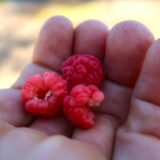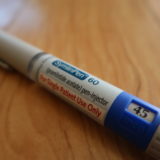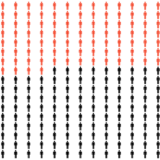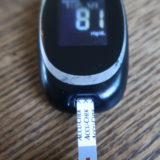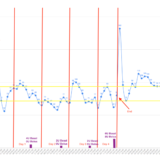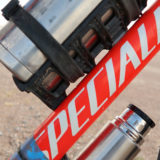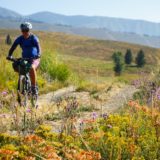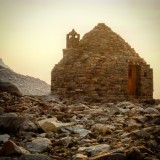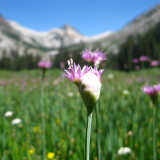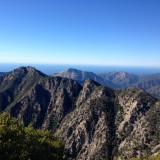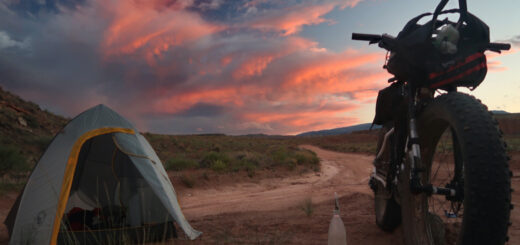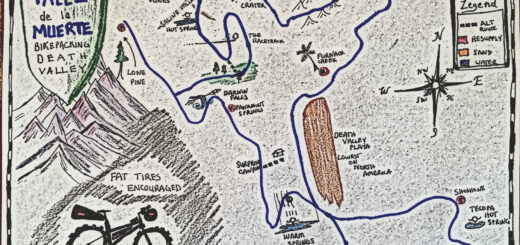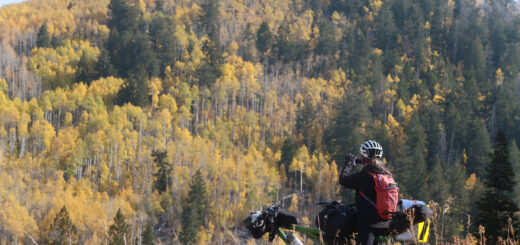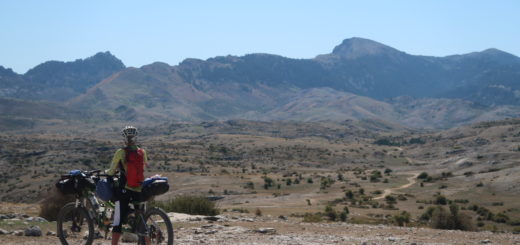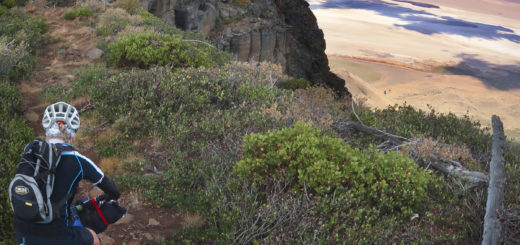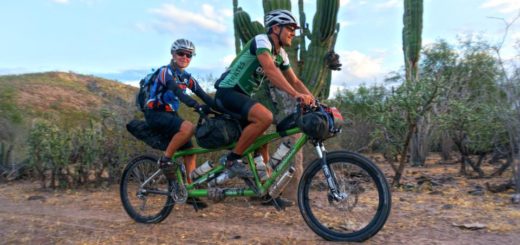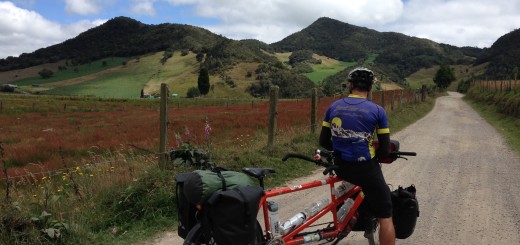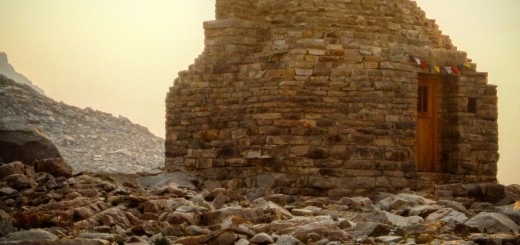12/10/2023 Bikepacking Mauritania Day 124 : Atar to Tidjikja Part 2 of 4
(I have decided to change the names of the people in today and tomorrow’s story so I could feel comfortable telling you everything).
I wanted to get an early start because the wind had been tranquil for the first 3 hours yesterday; I figured the same pattern would repeat today. Today when I woke, the wind was very strong, and it crescendoed dramatically once I started pedaling. With all my effort, I could go 7 painful miles per hour. To see where I was going, I peeked through one squinted eye; the other closed. At this speed, I did not have enough supplies to make it to the next known town, still 180 miles away. I saw a large puddle and took the muddy water - figuring I would filter it later if things got dire. 45 minutes and 5 miles later, I saw a concrete water tower. There was an old jug that had been cut in half and had been used for mixing concrete. I broke the rock out of its mold, and fashioned a bucket on a rope. The water inside the tower was only 1 foot deep, but enough! I gathered as much water as I could from the nearly empty tower. From that height, the wind felt dangerous. Normally, I rely on “fast and light” to get out of bad situations, but with the water weight and winds, I was heavy and slow. I was getting kind of scared, as this was starting to feel like a survival situation.
A few arduous miles later, I came to a tiny village. People were living here, so I figured, “if they can live in these conditions, so can I.” Inside a tiny shack, there was a robed man and a little store. The building seemed ramshackle, but it provided a remarkable amount of protection from the wind. He was friendly and sold me some bread. They invited me to sit on the floor for tea. As the wind raged and the sand flew, I started to realize: I’m not going anywhere today. All morning, adults came and went, they would shake everyone’s hands, including mine, jabber for a while about something, and then carry on. Children constantly gathered at the door. I was having trouble communicating; the tall and skinny shop owner spoke some French, but the Bedouin people here don’t unusually speak actual Arabic, meaning my app was of little use. One guy came to say hello, and he spoke clear and fluent French. Being so desperate to communicate, I stood up to talk to him - my French miraculously improving 10 fold as I dumped upon him my logorrhea of why I was here and what was going on. He explained some to the others.
Then Rashid came in to charge his phone; there is one solar panel in this village, and Rashid probably had the only phone. For some reason, when he talked to my phone, everything made sense. I asked him why. He said, “I am fluent in the Arabic language; here we speak a dialect, which is why you have strange translations from the other people.” Suddenly my world was brightening. Rashid and I could have long and in-depth conversations using the app. You could tell that he was educated, intelligent and experienced with handling the phone. I know this sounds so trivial to you, but when you’re in a small hot tent with 6,000 files, sand blowing everywhere, dozens of children and a constant rotation of robed men (and some women came and sat with us too), having a person who can explain it all is monumental.
Rashid kindly took me under his wing, and would tell others what I was saying. They could all understand a little Arabic, but not much compared to him. We talked about all sorts of things; I can’t tell you everything, but I’ll try and tel you a few interesting excerpts.
Rashid said that he is 30 years old. Next year he will be marrying his cousin. I wanted to make sure I got that right, and he said, “yes, I am marrying close: The daughter of my uncle”. I asked him if he was in love, and he looked up and with a shy smile said, “yes,” in English.
That may have been too close of a question, but he had previously said “You can ask me anything” I asked if my questions were too personal and he said “la, la”, which means “no” (by the way, “nam” means “yes”). I would eagerly await each new message as we passed the phone back and forth, learning yes and no gave me a head start on the answer.
It became apparent that the daily schedule here goes like this: Lie on the ground and drink tea with your friends and family. Walk over to the next tent and drink tea with your other friends and family. After that, wash hands, do a little prayer, and then go to another tent for tea…. We sat in one tent which was buzzing with hundreds of flies, rattled by the wind as dust swirled about. Children came and went to buy little candies. No one seemed to notice a black beatle the size of a walnut scuttle across the floor and hide under a pair of flip flops. Two different women sat on the floor and talked to me; one even removed her head covering and shook my hand that way where you clasp the other person’s hand from both sides.
Rashid took me to the tent of his grandmother. His grandmother and uncle live here because they prefer the Bedouin life, but his parents live in the city. I walked around the room with Rashid and shook hands with two unknown men and his gregarious uncle, Mehedi, who was constantly smiling and giggling. I liked him a lot; he smiled and laughed at everything. Rashid’s grandmother was slouched on the floor in a Jaba the Hut position. As I walked over to her to reach out and shake her hand, Rashid and another man jumped to grab me as if I were brandishing a knife. I never saw anyone move that quickly here. Shaking hands with granny was obviously wrong. I passed Rashid my phone to apologize. He understood, and said something back about “the holy prophet, men and killers”. I should have taken a screenshot so my Arabic reading friend Ally Glenesk could decipher the true meaning.
We sat around the cous cous bowl, and his uncle eagerly offered me to eat. They went to find a metal spoon and washed it - special for me. I told them, “I will eat like you.” We washed hands from a tea kettle and I decided to “let it go.” Yes, I will drink watered down camel milk from the shared fly-encrusted bowl being passed around. The only way for me to be here is to dissociate myself from myself. I had to flip an “off switch” in my mind several days ago, and just go with the flow. Did I make mistakes? Hell yeah. Eating cous-cous with your hands is not easy. They pack it into a ball grabbing some of the surrounding fish and veggies, popping it into their mouth as a single ball unit. No matter how tightly I packed, it just crumbled into my lap. No worries, though, his uncle picked the bits off of my legs and shorts and tossed them back into the communal platter. His giggle put me at ease.
The afternoon became hot. We lay on pillows and rugs, often in silence. Waiting. They excused themselves for a prayer sometime around 4pm. The kids were polite, a little curious, but did not talk a lot. I did try to make people laugh by telling jokes, but humor is difficult here. They did like it when I said “Rashid must be friends with the Apple Company because he is the only one who my phone understands.” They also liked my quip, “You don’t need to do a pilgrimage to Mecca: Allah is blowing it straight to you.”
Whew, Allah jokes are OK.
After that, they all wanted to know how far Mecca was, so we got out the map and it’s about 3500 miles away. I reckon the sands of Mecca take about 100 hours to arrive at this wind speed.
Rashid would come and go; I kind of clung to him like my lifesaver. He understood everything I said, whereas communication is vague but doable with the others.
My favorite part was when night fell. Rashid and I went to his house which was better than some of the others. The east facing wall was made of concrete block, fortified against the wind that almost always comes from that direction. The other walls were supported by sticks, wrapped in chain-link, with fabric held tautly over the structure. We and lay on our stomachs in the dark, passing the phone back and forth. It was like a sleepover party illuminated by a tiny battery powered LED. I asked him all sorts of questions about his family, the religion, his favorite soccer player (Cristiano Ronaldo) - everything.
He expressed great interest in coming to the United States. He wants to work for 10 to 15 years, save money, and then come back here. It’s a dream that Janet and I heard often during our travels. He hopes to accomplish this by marrying an American Woman.
Wait, what?
“Aren’t you marrying your cousin,” I thought, but didn’t ask.. this is probably a “little” cultural difference also.. plural transcontinental wives. I accept that some cultures do that. I kept a poker face so we could carry on with conversation about Islam, values, and lots of good stuff. It wasn’t until late that I started to notice that he hadn’t asked a single thing about me. No one here in Mauritania has had much curiosity about me or the outside world. I’ll often get two questions; where are you going and where did you come from. Apart from that, no other inquisitiveness about anything. Since I had been asking him so much about his family, and we were taking about how alcohol is prohibited here (and so is Marijuana, (but they smoke something different called “?Marjane?”)), I decided to tell him:
“My mom died very young from alcoholism; it is good that alcohol is prohibited here because it can be unhealthy.”
I expected him to say something about my mom, but instead he continued with the importance of adhering to the rules of Islam. He didn’t miss what I said because I mentioned her again in my next reply.
I so much wanted this to be a story of the kindness and generosity of the Bedouin people who I stayed with for 24 hours. And it still kind of is; they were kind to me. But as the evening started to come to a close, Rashid said, “Can you help me? I need you to give money to my grandmother.”
I had already been planning on offering them a 500 Orguya bill (enough to buy 50 loaves of bread as long as a 3 year old girl is tall). I really appreciated sheltering from wind, and I also enjoyed their company. That has value to me, and if the value to them is monetary, that is fine.
I almost left this part out of the story, but I think it has relevance to help you understand Africa. I try to keep these stories concise. Although the only thing Bedouins have in greater abundance than sand is time, I know that YOUR reading time is precious.
I asked Rashid, “how much do you need?” He pulled out his phone calculator and said “$150 USD”. I began to think about the day, and questioned if any of it was genuine. After all, he had not shown any reciprocal interest in my life or anything. Is that maybe a cultural thing too?
I told him that I wanted to give them money anyway, thanked him many times for their hospitality, and passed him the 500 note I had been planning to give them tomorrow. I apologized that it wasn’t as much as he wanted, and he understood.
I’ll stop there and let you mull that one over. They were nice enough. Maybe I should have given more. I always want to give to the kind people who won’t accept it - which makes me want to give them more. Should I have given Rashid more? 150 USD seems like too much - and I know that it would not have been equally distributed amongst the villagers (another story altogether). Do I want to perpetuate the notion that foreigners are traveling ATMs? So many moral dilemmas to consider here.
I ended up spending the night sleeping on the floor like everyone else. The floor is dirt, covered up with sandy rugs, a thin sleeping mat, and a pillow that feels like it was made from shrubbery. My stomach regurgitation problem was severe - probably due to drinking 12 cups of tea. I took a few walks outside of the hut; no worries of waking others over the sound of fabric rapping in the wind.
I wanted to get an early start because the wind had been tranquil for the first 3 hours yesterday; I figured the same pattern would repeat today. Today when I woke, the wind was very strong, and it crescendoed dramatically once I started pedaling. With all my effort, I could go 7 painful miles per hour. To see where I was going, I peeked through one squinted eye; the other closed. At this speed, I did not have enough supplies to make it to the next known town, still 180 miles away. I saw a large puddle and took the muddy water - figuring I would filter it later if things got dire. 45 minutes and 5 miles later, I saw a concrete water tower. There was an old jug that had been cut in half and had been used for mixing concrete. I broke the rock out of its mold, and fashioned a bucket on a rope. The water inside the tower was only 1 foot deep, but enough! I gathered as much water as I could from the nearly empty tower. From that height, the wind felt dangerous. Normally, I rely on “fast and light” to get out of bad situations, but with the water weight and winds, I was heavy and slow. I was getting kind of scared, as this was starting to feel like a survival situation.
A few arduous miles later, I came to a tiny village. People were living here, so I figured, “if they can live in these conditions, so can I.” Inside a tiny shack, there was a robed man and a little store. The building seemed ramshackle, but it provided a remarkable amount of protection from the wind. He was friendly and sold me some bread. They invited me to sit on the floor for tea. As the wind raged and the sand flew, I started to realize: I’m not going anywhere today. All morning, adults came and went, they would shake everyone’s hands, including mine, jabber for a while about something, and then carry on. Children constantly gathered at the door. I was having trouble communicating; the tall and skinny shop owner spoke some French, but the Bedouin people here don’t unusually speak actual Arabic, meaning my app was of little use. One guy came to say hello, and he spoke clear and fluent French. Being so desperate to communicate, I stood up to talk to him - my French miraculously improving 10 fold as I dumped upon him my logorrhea of why I was here and what was going on. He explained some to the others.
Then Rashid came in to charge his phone; there is one solar panel in this village, and Rashid probably had the only phone. For some reason, when he talked to my phone, everything made sense. I asked him why. He said, “I am fluent in the Arabic language; here we speak a dialect, which is why you have strange translations from the other people.” Suddenly my world was brightening. Rashid and I could have long and in-depth conversations using the app. You could tell that he was educated, intelligent and experienced with handling the phone. I know this sounds so trivial to you, but when you’re in a small hot tent with 6,000 files, sand blowing everywhere, dozens of children and a constant rotation of robed men (and some women came and sat with us too), having a person who can explain it all is monumental.
Rashid kindly took me under his wing, and would tell others what I was saying. They could all understand a little Arabic, but not much compared to him. We talked about all sorts of things; I can’t tell you everything, but I’ll try and tel you a few interesting excerpts.
Rashid said that he is 30 years old. Next year he will be marrying his cousin. I wanted to make sure I got that right, and he said, “yes, I am marrying close: The daughter of my uncle”. I asked him if he was in love, and he looked up and with a shy smile said, “yes,” in English.
That may have been too close of a question, but he had previously said “You can ask me anything” I asked if my questions were too personal and he said “la, la”, which means “no” (by the way, “nam” means “yes”). I would eagerly await each new message as we passed the phone back and forth, learning yes and no gave me a head start on the answer.
It became apparent that the daily schedule here goes like this: Lie on the ground and drink tea with your friends and family. Walk over to the next tent and drink tea with your other friends and family. After that, wash hands, do a little prayer, and then go to another tent for tea…. We sat in one tent which was buzzing with hundreds of flies, rattled by the wind as dust swirled about. Children came and went to buy little candies. No one seemed to notice a black beatle the size of a walnut scuttle across the floor and hide under a pair of flip flops. Two different women sat on the floor and talked to me; one even removed her head covering and shook my hand that way where you clasp the other person’s hand from both sides.
Rashid took me to the tent of his grandmother. His grandmother and uncle live here because they prefer the Bedouin life, but his parents live in the city. I walked around the room with Rashid and shook hands with two unknown men and his gregarious uncle, Mehedi, who was constantly smiling and giggling. I liked him a lot; he smiled and laughed at everything. Rashid’s grandmother was slouched on the floor in a Jaba the Hut position. As I walked over to her to reach out and shake her hand, Rashid and another man jumped to grab me as if I were brandishing a knife. I never saw anyone move that quickly here. Shaking hands with granny was obviously wrong. I passed Rashid my phone to apologize. He understood, and said something back about “the holy prophet, men and killers”. I should have taken a screenshot so my Arabic reading friend Ally Glenesk could decipher the true meaning.
We sat around the cous cous bowl, and his uncle eagerly offered me to eat. They went to find a metal spoon and washed it - special for me. I told them, “I will eat like you.” We washed hands from a tea kettle and I decided to “let it go.” Yes, I will drink watered down camel milk from the shared fly-encrusted bowl being passed around. The only way for me to be here is to dissociate myself from myself. I had to flip an “off switch” in my mind several days ago, and just go with the flow. Did I make mistakes? Hell yeah. Eating cous-cous with your hands is not easy. They pack it into a ball grabbing some of the surrounding fish and veggies, popping it into their mouth as a single ball unit. No matter how tightly I packed, it just crumbled into my lap. No worries, though, his uncle picked the bits off of my legs and shorts and tossed them back into the communal platter. His giggle put me at ease.
The afternoon became hot. We lay on pillows and rugs, often in silence. Waiting. They excused themselves for a prayer sometime around 4pm. The kids were polite, a little curious, but did not talk a lot. I did try to make people laugh by telling jokes, but humor is difficult here. They did like it when I said “Rashid must be friends with the Apple Company because he is the only one who my phone understands.” They also liked my quip, “You don’t need to do a pilgrimage to Mecca: Allah is blowing it straight to you.”
Whew, Allah jokes are OK.
After that, they all wanted to know how far Mecca was, so we got out the map and it’s about 3500 miles away. I reckon the sands of Mecca take about 100 hours to arrive at this wind speed.
Rashid would come and go; I kind of clung to him like my lifesaver. He understood everything I said, whereas communication is vague but doable with the others.
My favorite part was when night fell. Rashid and I went to his house which was better than some of the others. The east facing wall was made of concrete block, fortified against the wind that almost always comes from that direction. The other walls were supported by sticks, wrapped in chain-link, with fabric held tautly over the structure. We and lay on our stomachs in the dark, passing the phone back and forth. It was like a sleepover party illuminated by a tiny battery powered LED. I asked him all sorts of questions about his family, the religion, his favorite soccer player (Cristiano Ronaldo) - everything.
He expressed great interest in coming to the United States. He wants to work for 10 to 15 years, save money, and then come back here. It’s a dream that Janet and I heard often during our travels. He hopes to accomplish this by marrying an American Woman.
Wait, what?
“Aren’t you marrying your cousin,” I thought, but didn’t ask.. this is probably a “little” cultural difference also.. plural transcontinental wives. I accept that some cultures do that. I kept a poker face so we could carry on with conversation about Islam, values, and lots of good stuff. It wasn’t until late that I started to notice that he hadn’t asked a single thing about me. No one here in Mauritania has had much curiosity about me or the outside world. I’ll often get two questions; where are you going and where did you come from. Apart from that, no other inquisitiveness about anything. Since I had been asking him so much about his family, and we were taking about how alcohol is prohibited here (and so is Marijuana, (but they smoke something different called “?Marjane?”)), I decided to tell him:
“My mom died very young from alcoholism; it is good that alcohol is prohibited here because it can be unhealthy.”
I expected him to say something about my mom, but instead he continued with the importance of adhering to the rules of Islam. He didn’t miss what I said because I mentioned her again in my next reply.
I so much wanted this to be a story of the kindness and generosity of the Bedouin people who I stayed with for 24 hours. And it still kind of is; they were kind to me. But as the evening started to come to a close, Rashid said, “Can you help me? I need you to give money to my grandmother.”
I had already been planning on offering them a 500 Orguya bill (enough to buy 50 loaves of bread as long as a 3 year old girl is tall). I really appreciated sheltering from wind, and I also enjoyed their company. That has value to me, and if the value to them is monetary, that is fine.
I almost left this part out of the story, but I think it has relevance to help you understand Africa. I try to keep these stories concise. Although the only thing Bedouins have in greater abundance than sand is time, I know that YOUR reading time is precious.
I asked Rashid, “how much do you need?” He pulled out his phone calculator and said “$150 USD”. I began to think about the day, and questioned if any of it was genuine. After all, he had not shown any reciprocal interest in my life or anything. Is that maybe a cultural thing too?
I told him that I wanted to give them money anyway, thanked him many times for their hospitality, and passed him the 500 note I had been planning to give them tomorrow. I apologized that it wasn’t as much as he wanted, and he understood.
I’ll stop there and let you mull that one over. They were nice enough. Maybe I should have given more. I always want to give to the kind people who won’t accept it - which makes me want to give them more. Should I have given Rashid more? 150 USD seems like too much - and I know that it would not have been equally distributed amongst the villagers (another story altogether). Do I want to perpetuate the notion that foreigners are traveling ATMs? So many moral dilemmas to consider here.
I ended up spending the night sleeping on the floor like everyone else. The floor is dirt, covered up with sandy rugs, a thin sleeping mat, and a pillow that feels like it was made from shrubbery. My stomach regurgitation problem was severe - probably due to drinking 12 cups of tea. I took a few walks outside of the hut; no worries of waking others over the sound of fabric rapping in the wind.
Photos:

Sandy sunrise. You could look directly at the sun for several hours in the morning and evening.
What is was like out there before the storm.



Just in case, I grabbed water from a muddy mini-lake. Didn’t need to use it because I found a water tower later.

Here is the lake where I got the water. This guy had been blown out. I went to right him, but then realized it was a bad idea. What the heck is this? Maybe it had stingers? I flicked him back into the water.

A village before the one I spent the day in. This one seemed to be abandoned.

Lowering a heavy bucket full of water - not easy with the wind! It kept banging into the side of the tower.


One of many interesting translations.

I hung out in the little 7’ x 7’ shop for a while. The man would use the balance to measure out food. The counterbalance was a 500g bag of sugar, or a 1000g bag of cous cous. He repeated this over and over for each customer.
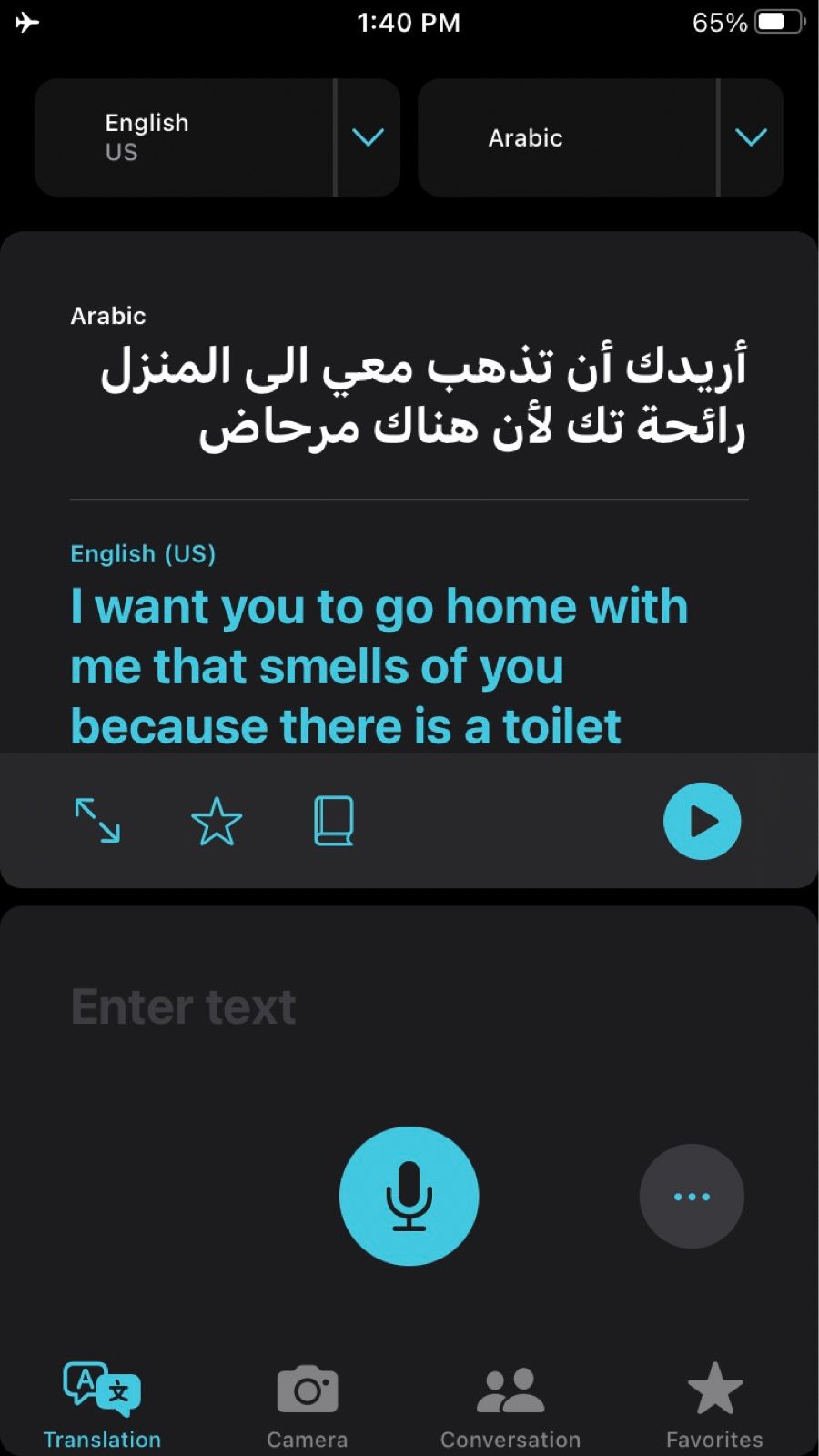
I asked Rashid, “Are you saying I am stinky?” After he said this. In the US, that would be a joke, but Rashid was serious and took me to the bathroom. One of the kids in the tent had been farting SBDs… but it wasn’t me! Rashid took me to the toilet hole and I was done quickly. I felt the need to explain, “I only had to pee” (so he would know it wasn’t me farting in the tent!)
🏕️

Eating this cous cous was not easy. Before I took the photo, there had also been some fish and a tiny amount of veggie on the platter. You grab a bit of each, then ball it up tightly with the cous cous. I’m not good at it yet.

The day was like night.
I snuck a video so you could get a tiny peek at what it was like inside of here. There are probably 4 other people on either side of me who you cannot see. I am in the back corner of the building here. It’s tight quarters.
🏠

Strava Comments:
Mark G.
What an absolute fabulous read, in all ways. I hope you stomach has a better time in part 3. BTW...you could have told "Rashid" "maybe the person that smelled it dealt it" 🦨💨
Dirk D.
Great reads indeed Brian, your adventures out there; beats most travel shows/travelogues on tv and the likes. Tough dilemma there in the end I agree…
Ann L.
Very interesting story. Glad you were able to post again. Was starting to worry when we had not seen anything in a few days, then Janet told me she had heard from you.
J.L. D.
Amazing the adventures you embark on
Janet W.
I feel like Allah brought you together with Rashid and his family and friends 3 days ago. You were riding option C, the most remote route, across Mauritania exactly for this reason, to meet Bedouin people. Most travelers wouldn't have the curiosity and openness to exchange stories all day. I'm glad you're getting to experience the real Africa, and I'm glad you gave Rashid the money. Everyone needs it and they were very generous.
Sօʀƈɛʀɛʀ 🅅.
The Bedouin version of ass, grass, or gas, no one rides for free.
Ride Stats:
| Elapsed Time | Moving Time | Distance | Average Speed | Max Speed | Elevation Gain | Calories Burned |
|---|---|---|---|---|---|---|
|
13:14:24
hours
|
01:50:55
hours
|
24.59
km
|
13.30
km/h
|
45.05
km/h
|
214.80
meters
|
1,867
kcal
|








